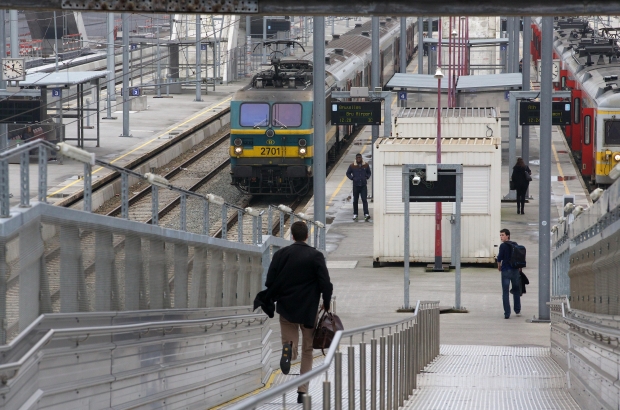- Daily & Weekly newsletters
- Buy & download The Bulletin
- Comment on our articles
Official inquiry examines still-unfinished Mons railway station fiasco
The Mons railway station was supposed to have been constructed by 2015, when the city was European Capital of Culture, but as the project remains over-budget and unfinished 22 years after its inception, an official parliamentary inquiry aims to examine what went wrong.
A final report is still forthcoming, but Belgium’s federal mobility minister Georges Gilkinet (Ecolo) has already conceded to Le Soir that “the project was not managed in an optimal way”.
The original project aimed to create a bridge between the two parts of the city of Mons in Wallonia and is currently eight years behind schedule.
It has been something of a white elephant given the massive investment involved and the lack of progress over more than two decades. Costs have soared from an initial €37 million to almost 10 times that amount - €324 million.
Back in June 2021, the Chamber asked the Court of Audit to draw up a report on the following elements: project management, deadlines, budgets and public contracts.
The court repeatedly complained that the audit itself was running into issues due to the late delivery of information and poor documentation of the history of the project, including key decisions and the budget.
But Gilkinet emphasised that “shedding light on this emblematic issue and on compliance with legislation on public contracts” is an essential step, not only for unravelling what went wrong with the Mons station but also for ensuring it doesn’t happen again.
Some intended steps towards that end include providing a clear framework to railway companies, in particular in terms of infrastructure.
“New station projects will have to be exemplary,” Gilkinet said.
“In future, priority will be given to standardising the reception infrastructure and speeding up the development of facilities to promote accessibility at the best price-quality ratio.”
The Ecolo-Groen group, which pushed hard for the report, said the information revealed so far “highlights the excessiveness and disastrous management of a project that has clearly broken many rules”.
“The budgetary choices made to support the Mons project have penalised fundamental investment choices in terms of maintaining the quality of the network, the quality of the reception and accessibility during 2010,” reads a scathing statement from the group.
“The mismanagement appears to be totally indecent.”
In the meantime, attempts are being made to salvage the disastrous project.
Negotiations are underway on new management contracts for SNCB and Infrabel, and Ecolo-Groen is calling for federal mobility authorities to be given new capacities to ensure a tight control of expenditure.
The Groen party also intends to demand answers from the chief executive of the SNCB in a parliamentary hearing.
“The station must be completed by the summer of 2023, because European subsidies are at risk if the project is not completed by then,” said Nicolas Parent, a Groen federal deputy.
“Politically, what can we do? We have already asked that Sophie Dutordoir, the chief executive of the SNCB, be heard by the mobility committee. To date, we have not received any concrete answers. The SNCB must be confronted with this audit by the Court of Auditors.”
The Mons project was first pitched back in the year 2000 by then-mayor Elio Di Rupo (PS), who wanted to renovate and modernise the Hainaut capital.
A competition was organised in 2006 to build a footbridge over the tracks that would link the older part of town with the Grands Prés development site, preserving the existing station.
But the Court of Audit’s investigation reveals that this may have been rigged from the start.
“The designation of the winner of the competition is marred by shortcomings in terms of transparency, equality and competitive tendering,” its report reads.
Various changes to the project over time transformed its intent and scale significantly. In some cases, public competitions should have taken place but did not.
“A modification to a contract in the course of performance, which is of a substantial nature, implies in principle the organisation of a new award procedure,” the report pointed out.
“There is no doubt that the file contains a host of clues that confirm the 'substantial' nature of this development, starting with the budget forecasts that have been substantially revised upwards and the amendments to the fee contract [previously] concluded.”
The findings released so far are damning, and include illegal public contracts in addition to the rigged competitions and lack of transparency.
“The reaction to this report must not give the impression that the faults revealed by the Court of Auditors should go unpunished,” said Catherine Fonck, leader of the Les Engagés group.
“The interests of the state and the citizens must be safeguarded. I ask the minister of mobility to take the matter to court and to file a civil suit. It cannot be otherwise, given the seriousness of this report.”
SNCB has not yet responded to press inquiries, saying it had not yet received the final report and could therefore not yet comment.



















